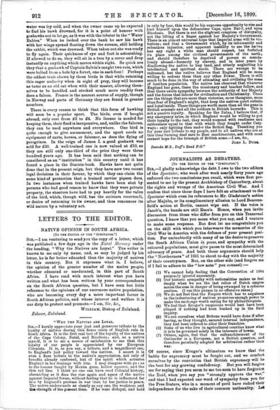"WHY THE NATIVES ARE LOYAL.
SIR,—I keenly appreciate your just and generous tribute to the loyalty of natives during this fierce crisis of English rule in South Africa. It is the first real test of the loyalty of the natives of the Cape Colony, Natal, and Rhodesia ; and, as a native myself, it is to me a source of satisfaction to see that. this loyalty of our people is appreciated by our European Colonists. It is, as you say, a tribute, and a magnificent one, to England's just policy toward the natives. I assert it is even a finer tribute to the native's appreciation, not only of benefits already conferred, but cf the spirit which actuates England in her dealings with him. I may disagree with yo I as to the lessons taught by Maxim guns, hollow squares, and the thin red line. I think no one can have read Colonial history, chronicling as it does the rise again and again of the native against Imperial forces, without feeling that he is influenced far le-s by England's prowess in war than by her justice in peace. The native understands as clearly as any one, the weakness and
the strength of the present time. If he were disloyal, and held
in only by fear, this would be his supreme opportunity to rise and hurl himself upon the defenceless Cape, upon Natql, and upon Rhodesia. But there is not the slightest symptom of disloyalty, not the lifting of a finger against her Majesty's Government. There is an almost universal hope that Imperial arms will be vic- torious; and that a Government which, by its inhumanity and relentless injustice, and apparent inability to see the native has any right a white man should respect, has forfeited its place among the civilised governments of the earth; and should therefore be deprived of powers so scanda- lously abused—formerly by slavery, and in later years by disallowing the native to buy land, and utterly neglecting his intellectual and spiritual needs. There are wrongs to be redressed, but the native believes that England will be more willing to redress them than any other Power. There is still much to be done in the way of educating and civilising the masa of heathen population. The native has observed that wherever England has gone, there the missionary and teacher follow, and that there exists sympathy between the authority of her Majesty and the forces that labour for civilisation and Christianity. These are the things that are more than victories, more thanguns, more than fear of England's might, that keep the natives quiet outside and loyal inside. These things are worth more than all the guns in British arsenals and all the soldiers in British barracks. This is not a passive loyalty. Speaking for the Zulus, I believe that, if any emergency arise, in which England would be willing to put their loyalty to the test, they would respond with readiness and enthusiasm equal to that with which they fought under Cety- wayo : only fighting then under the British flag. Thanking you for your just tribute to my people, and to all natives who are at this time turning deaf ears to Boer machinations, and with most earnest hope for the triumph of British arms.—I am, &c.,
Inanda M.S., Duff's Road P.O."
joust L. Dupe.










































 Previous page
Previous page